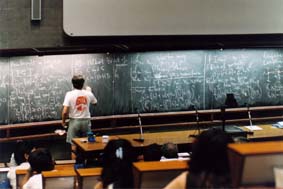Personal tools
News from ICTP 104 - Commentary

Every human being who is capable of learning how to speak a language is also capable of acquiring not just simple but deep mathematical skills, says ICTP's new mathematics group head Le Dung Trang.
Culture of Mathematics
Research on brain function and
behaviour has highlighted the central role of language in all
human activities.
Language is indispensable both for comprehending what is happening
around us and for learning new ideas. Put another way, without
language it is difficult to understand and to learn.
Research, moreover, also has shown that language is a cornerstone
of culture: That the language we speak has a great bearing on
who we are--precisely because it serves as a major force driving
the socialisation process.
If language is culture-bound, mathematics has long been viewed
as a culture-free, universal source of knowledge and understanding.
Yet language at its core evolves around a set of rules and codes
that parallel the rules and codes framing mathematics. For this
reason, I would contend that language capability is a deep and
complex reflection of mathematical capability and that both, in
turn, are 'naturally' present in all human beings.
I use the word 'naturally' in a broad sense and not as a concept
that language stems only from genetic predisposition. Because
of the close ties between language and mathematics, I have concluded
that every human being who is capable of learning how to speak
a language (that means virtually everyone) is also capable of
acquiring not just simple but deep mathematical skills. After
all, the logic and abstract understanding embodied in language--translating
sounds, images, ideas and facts--into a common base of understanding
represents the very principles of mathematics as well. Language
skills, however, do not translate easily into mathematical skills.
As many math-challenged people will readily admit, mastering mathematics
is not easy.

If these common strains between language and mathematics are true,
then they raise serious questions about our abiding beliefs in
the culture-free universality of mathematics, particularly the
creation of mathematics. Perhaps it is not by chance that the
Greeks invented geometry or that the Arabs invented algebra.
Instead of concluding that mathematics--and, by implication, science--progresses
on the shoulders of individual geniuses, we should consider the
fact that progress is driven, in part, by differences in cultures
that enable gifted individuals within these cultures to explore
and shed light on unanswered mathematical problems from different
perspectives.
These differences may be comparable to those we find in musical
expression among various cultures. Everyone follows the same scales
and notes but the sound of the music--and the pleasure we derive
from such sounds--varies enormously. And so do the compositions
of a culture's most gifted musicians.
Today we continue to find differences in mathematical interest
depending on the culture involved. French-born mathematicians,
for example, have a preference for large systems, particularly
those related to algebra and geometry. US-born mathematicians
lean towards topology, most notably low dimensional topology.
Italian mathematicians often concentrate on geometry, especially
algebraic geometry, while Japanese mathematicians have displayed
keen interest in mathematical formulae and combinatorial mathematics.
What are we to make of these diverse preferences for the study
of mathematics? We still do not know enough about the relationship
between genetics and nurturing to determine whether these differences
are simply intriguing facts without explanation or a reflection
of something deeply revealing about the essence of mathematics
and culture.
No one would claim that language is disconnected from culture.
It may now be time to consider that the same is true of mathematics.
Le Dung Trang
Head, ICTP Mathematics Group